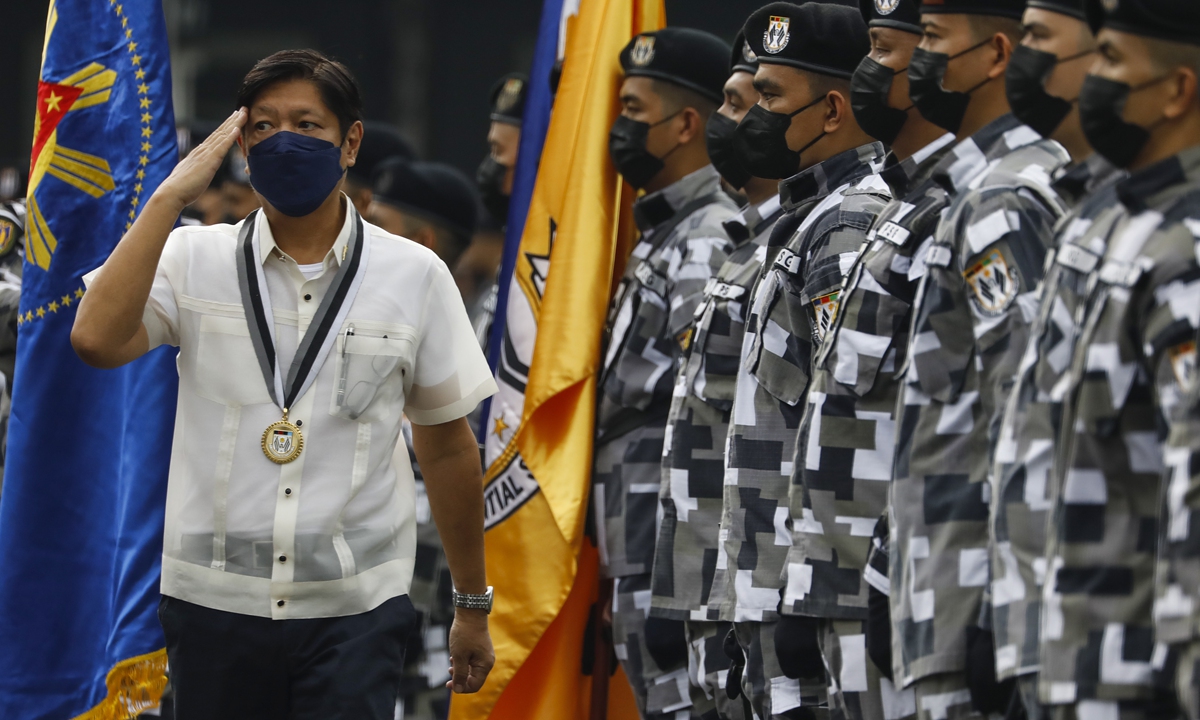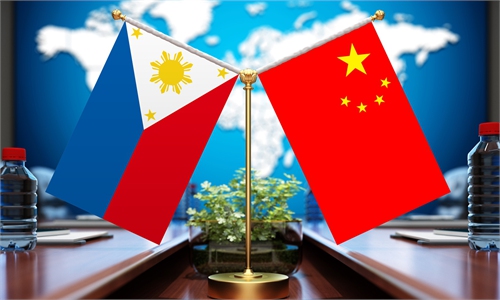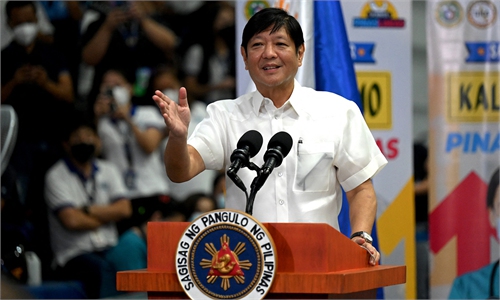
Philippine President Ferdinand Bongbong Marcos Jr. walks past troopers of the Presidential Security Group (PSG) during PSG Change of Command ceremonies at Malacanang Palace grounds in Manila, Philippines, on July 4, 2022. Photo: IC
At the invitation of Chinese President Xi Jinping, Philippine President Ferdinand Romualdez Marcos Jr. will pay a state visit to China from Tuesday to Thursday, which experts believe will promote China-Philippines relations to enter a "golden era" and fully demonstrates that China and the Philippines have embarked on a relatively mature and stable track.
It will be the first visit of Marcos to China as president and his first official visit to a country outside ASEAN members, showing that the two countries highly value the bilateral relationship, Wang Wenbin, spokesperson of the Chinese Foreign Ministry, said at a routine press conference on Friday.
This shows the importance the Philippine administration attaches to its relations with China and the great sincerity of the Marcos government for the sustainable development of China-Philippines cooperative relations, analysts said.
During the visit, President Xi will hold a meeting with Marcos, and Premier Li Keqiang and Chairman of China's National People's Congress (NPC) Standing Committee Li Zhanshu, will also meet the Philippine leader. The top leaders of the two countries will discuss and exchange views on the bilateral relationship and on regional and global issues, leading China-Philippines relations toward further development, according to the spokesperson.
Both sides are expected to continue to promote the high-quality development of Belt and Road initiative projects and large-scale infrastructure, Ge Hongliang, director of the China-ASEAN Maritime Security Research Center at Guangxi University for Nationalities, told the Global Times on Monday.
Since Marcos is also the agriculture secretary, cooperation between China and the Philippines in agriculture is likely to be a big focus of the visit, Ge said.
A deal is expected to be signed during Marcos's trip establishing a direct line between China and the Philippines' foreign ministries "to avoid miscalculation and miscommunication" in the disputed sea, Philippine Foreign Affairs Assistant Secretary Nathaniel Imperial said at a televised briefing on Thursday. "The president has said the maritime issues don't define the totality of our relationship with China, but he acknowledges the importance of this issue," he said.
Observers believe that after repeated negotiations, China and the Philippines have found a way to achieve mutual benefit and win-win results, that is, to open their hearts and conduct candid exchanges and dialogue.
The intensification of the conflict between Russia and Ukraine has made many ASEAN members see the negative impact on geopolitics and regional relations, Chen Xiangmiao, director of the world navy research center at the National Institute for South China Sea Studies, told the Global Times.
Therefore, good communication between China and the Philippines can create a good foundation for future economic cooperation between the two sides, which is in line with the development of the current regional situation, especially the development of the global economy, Chen said.
In 2021, China was the Philippines' top trade partner, with total trade valued at $38.35 billion. It was also the country's second-largest export market worth $11.55 billion, and a leading source of imports valued at $26.8 billion.
China has all along adopted a relatively restrained and rational position, attitude and policy on the South China Sea issue, and all these have led the Philippines to move toward cooperation rather than confrontation with China on the issue, Chen said.
In recent times, senior Washington officials have done a lot of "work" in Southeast Asia. Just before the ASEAN Defense Ministers' Meeting Plus, US Vice President Kamala Harris talked about "intimidation and coercion in the South China Sea" in the Philippines, but Marcos did not take up the thread of the conversation.
A press statement released on December 19 by US Department of State said that Washington "supports the Philippines' continued calls upon the People's Republic of China (PRC) to respect the international law of the sea in the South China Sea, as reflected in the UN Convention on the Law of the Sea."
The spokesperson of the Chinese Embassy in the Philippines then responded that the statement contains unfounded accusations against China in an attempt to stir up troubles and drive a wedge between China and the Philippines.
The US keeps meddling in the South China Sea disputes and trying to drive wedges between countries in the region, creating tensions and harming regional peace and stability. What the US has done is not to help anyone but to serve its own geopolitical interests, the embassy said.
The US has obvious strategic interests in the South China Sea, which is to kidnap the interests of other countries with its own interests. However, the Philippines or other ASEAN members know clearly that tensions in the South China Sea or turbulence in the region are not in their interests, experts said.


